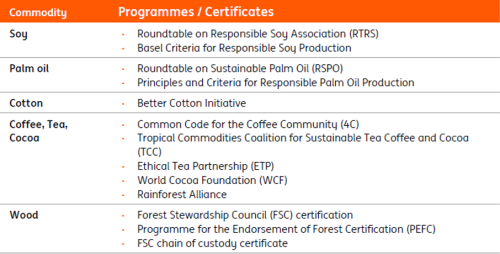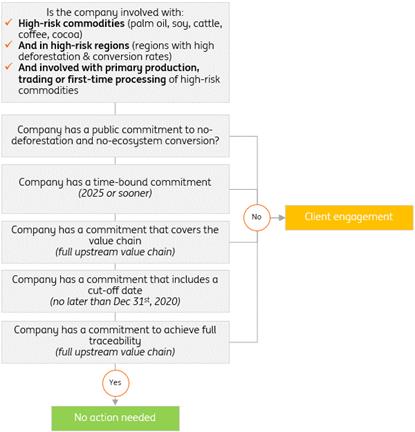Deforestation
According to the Food and Agriculture Organisation of the United Nations, forests cover 31% of Earth’s land surface. This coverage is rapidly being reduced through human activities such as urbanisation, fires and logging. Between 2015 and 2020, the rate of deforestation was estimated at ten million hectares per year1. Agricultural expansion is the main driver of deforestation and forest degradation, which results in the loss of (forest) biodiversity.
With the world population now having passed the eight billion mark, the challenges to feed the world and at the same time protect the planet’s forests will increase.
Our Environmental and Social Risk policy sets standards for our clients active in the agricultural commodities sector. These standards are part of the due diligence we perform on clients in this sector.
Some of those standards include asking clients whether they comply with certain programmes and/or certifications. For example, below are some of the programmes and certificates we consider to be relevant to the agricultural commodities sector (this list is non-exhaustive):

1Data from the Food and Agriculture Organization of the United Nations (FAO)
We do not engage with clients that have been involved in illegal deforestation and/or the removal of High Conservation Value (HCV) or primary forest.
We realise that all agricultural land had to have been initially cleared of its naturally occurring flora, which may or may not have involved the removal of protected forest areas. Although we cannot always ascertain which of this land used to be HCV or primary forest in the past, we make an effort to determine whether deforestation of HCV or primary forest took place over the past five years when requested to finance a specific transaction for a client in the agricultural commodities sector. We consider the direct involvement of the (potential) client and the extent to which it tried to prevent deforestation.
In addition to the due diligence activities described above, we are engaging in a risk-based manner with targeted clients active in cattle, palm oil, soy, cocoa, or coffee. We’re using our influence and leverage to encourage them to put in place no-deforestation and no-ecosystem conversion commitments and regarding their actions and targets to work towards full traceability in their supply chains. The commodities in scope are based on guidance coming from the EU Regulation on Deforestation-free products and our existing exposure to these commodities. For wood and rubber, the engagement (as highlighted above) takes place in line with our regular ESR policy standards, which for instance include an FSC or PEFC certification requirement for wood. For the other commodities mentioned, engagement is based on the decision tree below.

Schematic view of ING’s engagement approach to address deforestation and ecosystem conversion
This approach applies to clients active in farming, trading or first-time processing involved with high-risk commodities in high-risk regions, as shown in below table:
| Producing countries | Palm oil | Cattle | Soy | Cocoa | Coffee |
| Latin America | |||||
| Brazil | X | X | |||
| Peru | X | ||||
| Argentina | X | X | |||
| Paraguay | X | ||||
| Colombia | X | ||||
| Ecuador | X | ||||
| Guatemala | X | ||||
| Honduras | X | ||||
| Asia | |||||
| Indonesia | X | X | X | ||
| Malaysia | X | ||||
| Africa | |||||
| Uganda | X | ||||
| Nigeria | X | ||||
| Côte d’Ivoire | X | ||||
We aim to engage all clients in scope of this approach, with the objective to understand where they stand when it comes to addressing deforestation and ecosystem conversion, what challenges they might have in their journey, and what support they may need from us in our role as financer. Where needed we will encourage our clients to put in place stronger commitments and/or disclosures. We also monitor if our clients are making progress to ensure alignment with ING's ambitions. For that proportion that remain unable or unwilling to progress on the criteria communicated to those clients, we may (as of 2027), on a case-by-case basis, apply stricter credit conditions on the type of business we want to do with these clients, or cease financing them altogether.
Aiming for full traceability is one of the engagement criteria. Full traceability helps to verify whether and where adverse impacts occur. We recognise that not all our clients currently have full traceability over their supply chains. We therefore plan to engage with our clients in the manner set out above to discuss where they stand and what their commitment is with respect to traceability.
On 29 June 2023, the EU Regulation on deforestation-free products entered into force. Under this regulation, companies placing high risk commodities like cattle, cocoa, coffee, palm oil and soy on the EU market, or exporting from it, are required to conduct extensive diligence on their value chain. Financial Institutions, like ING, are not in scope of EU Deforestation Regulation. ING voluntarily started mapping high risk commodities and clients, and we decided to publish our assessment annually. As the regulatory environment is ever-changing, our approach may very well be updated in the future.
Our engagement approach does not replace existing (sometimes stricter) requirements already included in the ESR policy framework. For instance, our regular ESR screening of high-risk clients includes a check on adverse impacts. If research or third parties indicate clients might be linked to deforestation, we verify this information with the client. This may lead to further engagement with our clients to understand if actual adverse impacts are happening and what actions our clients are taking to address these impacts. If engagement on these adverse impacts is not possible, we may consider several actions that may ultimately even include the termination of our relationship with the client.
We developed a methodology to assess and monitor the progress of our efforts on this topic on an annual basis. More details on our approach, as well as on our first assessment results and progress of engagement can be found in our Update on addressing deforestation and ecosystem conversion. By disclosing this, ING aims to be transparent in our approach and analyse if our efforts are working to contribute to a deforestation-free and ecosystem conversion-free world.
You might also be interested in:
- Our policies
- What do independent specialists say about sustainability and ING?
Contact
Mail to: Sustainability@ing.com
